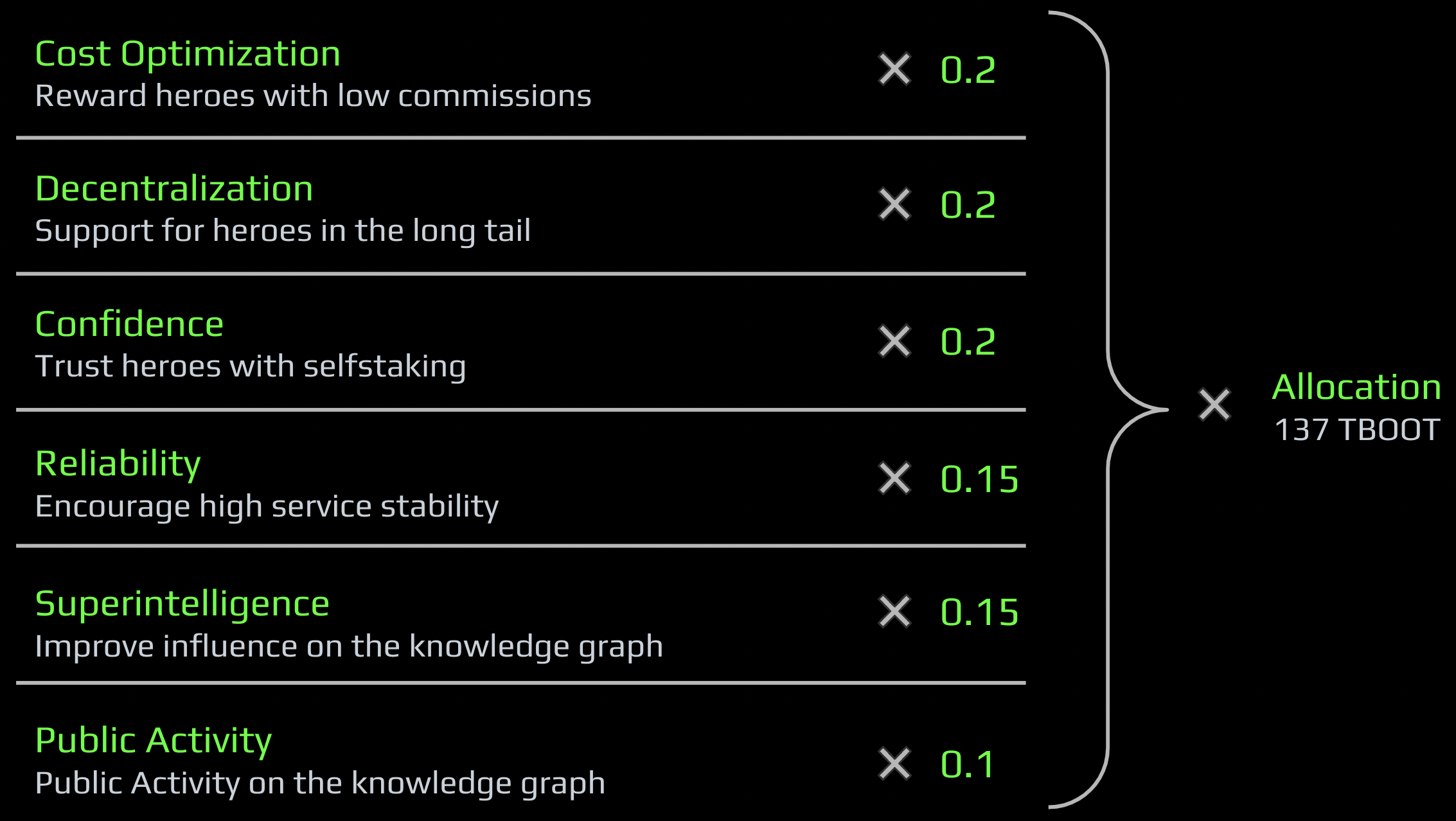The toolkit provides a delegation strategy for bostrom heroes from cyber~congress multisig.
The aim is to build a strong hero set by endorsing their stake with cyber~congress power. According to cyber~congress values, decentralization, confidence, reliability, and superintelligence will be encouraged. Also, additional delegations from cyber~congress will help cover maintainance of validators running costs.
The toolkit should help distribute multisig tokens in the correct way and to automatize the delegation/redelegation/unbonding processes.
The result of the tool execution is a pivot table with all calculations in detail and unsigned transaction files for signing and broadcasting.
 The allocation of the delegation strategy program is 135 TBOOT.
The allocation of the delegation strategy program is 135 TBOOT.
ALLOCATION = 137_420_000_000_000The criteria shares are:
COST_OPTIMIZATION = 0.20
DECENTRALIZATION = 0.20
CONFIDENCE = 0.20
RELIABILITY = 0.15
SUPERINTELLIGENCE = 0.15
PUBLIC_ACTIVITY = 0.10JAILED_WINDOW = 200_000 # blocks
NUMBER_OF_JAILS_FOR_KICKOFF = 2
BLACK_LIST = []
MSGS_IN_TX = 3 # maximum for Ledger nano x with cybercli
DELEGATOR_ADDRESS = 'bostrom1xszmhkfjs3s00z2nvtn7evqxw3dtus6yr8e4pw'Each hero decides which commission he wants to grab from their delegators. The mechanics provides resources for heroes to maintain their nodes in a highly reliable way. Some heroes skip this simple rule and keep zero-fee validators online for some kind of advertisement. On the other hand, some of the validators increase their commission rates up to 100%. Both of these cases are not encouraged. The distribution function for cost endorsement will be:
def get_cost_optimization_endorsement(
cost_optimization,
cost_optimization_sum,
):
return int(cost_optimization / cost_optimization_sum * ALLOCATION * COST_OPTIMIZATION)where:
cost_optimization_sum is the sum of cost_optimization for all heroes
cost_optimization is:
def get_cost_optimization(commission: float):
if 0.01 <= commission <= 0.10:
return 1 / (commission**2)
else:
return 0This is a very easy function that gives a hero 1 / (commission**2) if his commission rate is between 1% and 10% and gives 0 points otherwise.
This criterion precedes the following goals:
- Increasing the number of heroes that can halt the network
- Increasing the number of heroes that can fork the network
- Supporting validators in the long tail, including sets of inactive heroes
The idea is to rank validators descending by staked tokens and to give them weighted points:
def get_decentralization(rank):
return rankThen, distribute tokens:
def get_decentralization_endorsement(decentralization, decentralization_sum):
return int((decentralization / decentralization_sum) * ALLOCATION * DECENTRALIZATION)The hero's confidence shows the relationship between the tokens that the hero has delegated to himself and the tokens that are delegated to him by the community. If the hero is not ready to put tokens on the validator he supports, then his confidence level is low. That is why only those heroes who believe in themselves will be encouraged.
def get_confidence(ownership):
return 1 - (1 / (1e-32 ** (-ownership)))And the distribution is:
def get_confidence_endorsement(confidence, confidence_sum):
return int((confidence / confidence_sum) * ALLOCATION * CONFIDENCE)This criterion shows the power of the hero or the product of Volts and Amperes owned by the validator.
import math
def get_superintelligence(power):
return math.log10(power + 1)The distribution is:
def get_superintelligence_endorsement(superintelligence, superintelligence_sum):
return int((superintelligence / superintelligence_sum) * ALLOCATION * SUPERINTELLIGENCE)The most complex criteria. It should help to understand the sustainability of the hero node set-up.
Here the subcriteria will be defined:
- jails
- tokens blurring
jails is the amount of unjail transactions from the hero. In other words, this subcriterion is about how many times the validator was jailed for some kind of misbehavior in the JAILED_WINDOW.
tokens blurring is the ratio between staked and delegator_shares tokens. It shows how many tokens a validator lost because of slashing.
The sum of the normed of that subcriteria forms reliability criteria:
def get_reliability(jails, staked, delegator_shares):
tokens_bluring = staked / delegator_shares
if tokens_bluring == 1 and jails == 0:
return 3
else:
return 1 / 2 ** jails + tokens_bluring ** 2The token loss is very serious misconduct. If the validator didn't lose anything, the tokens_blurring will be equal to 1. Also, if the amount of jails during the JAILED_WINDOW is 0, validator gets 3 points. Otherwise the halving function for jails and square for tokens_blurring are using.
The distribution is:
def get_reliability_endorsement(reliability, reliability_sum):
return int((reliability / reliability_sum) * ALLOCATION * RELIABILITY)This criterion shows the public activity in the cybergraph. The moon passport is the base namespace in Bostrom network and cybergraph.
Here the public activity will be defined:
- possession of a moon passport
- posting logs for a last month
(in future epoches) - sending messages in sence for a last month
(in future epoches)
def get_passport(address: str) -> Optional[str]:
if address[:14] == 'bostromvaloper':
address = str(Address(bytes(Address(address, prefix='bostromvaloper')), prefix='bostrom'))
try:
return query_contract(contract_address=PASSPORT_CONTRACT,
query={"active_passport": {"address": address}},
node_lcd_url=LCD_API)['data']['extension']['nickname']
except KeyError:
return NoneThe distribution is:
def get_public_activity_endorsement(exist_passport: bool, validators_with_passports_cnt: int) -> int:
return int(exist_passport / validators_with_passports_cnt * ALLOCATION * PUBLIC_ACTIVITY)In that list heroes who are quitting will be placed.
- Install requirements
pip3 install -r requirements.txt-
Fill
config.py -
Run script
python3 redelegation.pyThe result of the script execution is .csv file with pivot table
-
The script gets all validators from the network
-
Ranks them by tokens (voting power)
-
Kicks off jailed validators
-
Kicks off validators with number of jails in
JAILED_WINDOWmore thanNUMBER_OF_JAILS_FOR_KICKOFF. -
Kicks off heroes from the
BLACK_LIST -
Calculates endorsements and sorts heroes descending by total
-
Saves pivot table in
./delegation_strategy.csv -
Generates unsigned transactions by
MSGS_IN_TXmessages in transaction fromDELEGATOR_ADDRESSaddress.
Here is the result of script execution for the last epoch.
You can learn how multisig works by CLI in the guide, below are examples regarding transactions of this repository.
- Sign transaction from multisig participants
cyber tx sign txs/unsigned_0.json --multisig=$MULTISIG_NAME --from=$WALLET_NAME --output-document=txs/signed_0_1.json --chain-id=bostrom --node https://rpc.bostrom.cybernode.ai:443- Create combined multisig transaction
cyber tx multisign txs/unsigned_0.json $MULTISIG_NAME txs/signed_0_1.json txs/signed_0_2.json --chain-id=bostrom --node https://rpc.bostrom.cybernode.ai:443 &> txs/signed_combined_0.json- Broadcast transaction
cyber tx broadcast txs/signed_combined_0.json --chain-id=bostrom --node https://rpc.bostrom.cybernode.ai:443 cyber tx authz exec txs/unsigned_0.json --from=$FROM_NAME --note='cyber~congress delegation strategy program https://github.com/cybercongress/delegation-toolkit' --chain-id=bostrom --gas=10000000 --node https://rpc.bostrom.cybernode.ai:443
